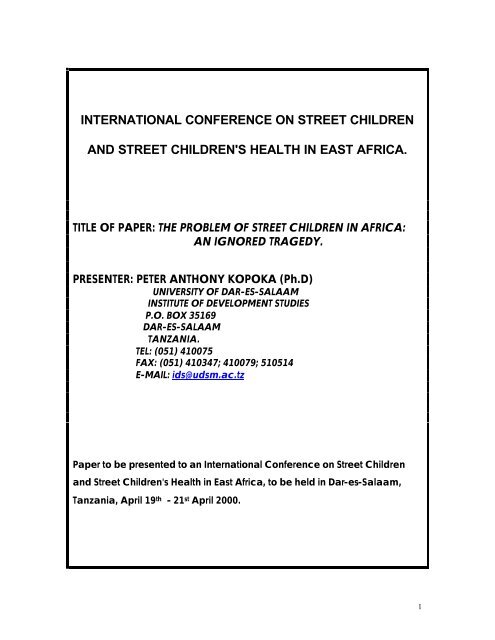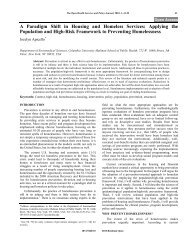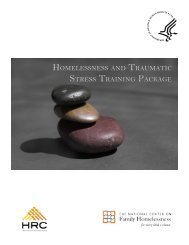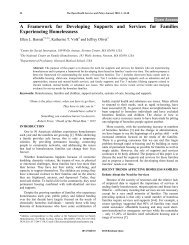international conference on street children and street children's
international conference on street children and street children's
international conference on street children and street children's
Create successful ePaper yourself
Turn your PDF publications into a flip-book with our unique Google optimized e-Paper software.
INTERNATIONAL CONFERENCE ON STREET CHILDREN<br />
AND STREET CHILDREN'S HEALTH IN EAST AFRICA.<br />
TITLE OF PAPER: THE PROBLEM OF STREET CHILDREN IN AFRICA:<br />
AN IGNORED TRAGEDY.<br />
PRESENTER: PETER ANTHONY KOPOKA (Ph.D)<br />
UNIVERSITY OF DAR-ES-SALAAM<br />
INSTITUTE OF DEVELOPMENT STUDIES<br />
P.O. BOX 35169<br />
DAR-ES-SALAAM<br />
TANZANIA.<br />
TEL: (051) 410075<br />
FAX: (051) 410347; 410079; 510514<br />
E-MAIL: ids@udsm.ac.tz<br />
Paper to be presented to an Internati<strong>on</strong>al C<strong>on</strong>ference <strong>on</strong> Street Children<br />
<strong>and</strong> Street Children's Health in East Africa, to be held in Dar-es-Salaam,<br />
Tanzania, April 19 th - 21 st April 2000.<br />
1
ABSTRACT:<br />
The twenty-first century presents a hostile face to many milli<strong>on</strong>s of <strong>children</strong> in<br />
many African countries. An increasing number of <strong>children</strong> are being forced to the <strong>street</strong>s<br />
as result of poverty, abuse, torture, rape ab<strong>and</strong><strong>on</strong>ment or orphaned by AIDS. Human<br />
rights violati<strong>on</strong>s against <strong>children</strong> in the 1990s have become a comm<strong>on</strong> <strong>and</strong> disturbing<br />
occurrence in many African countries. Indeed denial of basic human <strong>and</strong> legal rights<br />
including the right to life, liberty <strong>and</strong> security as a pers<strong>on</strong> to <strong>children</strong> are now a defining<br />
feature of the African socio-ec<strong>on</strong>omic l<strong>and</strong>scape.<br />
This paper examines Africa's resp<strong>on</strong>se to the growing problem of <strong>street</strong> <strong>children</strong>.<br />
Taking Tanzania as a case study the paper examines initiatives that have been <strong>and</strong> are<br />
being taken by various segments of the community to address the problem of <strong>street</strong><br />
<strong>children</strong>. What kinds of policies <strong>and</strong> strategies are African governments putting in place,<br />
what is the family <strong>and</strong> community doing? For instance, to what extent are families,<br />
schools <strong>and</strong> individual members of society dealing with the problem? Indeed, how is the<br />
government dealing with the increasing numbers of unsupervised <strong>children</strong> living al<strong>on</strong>e in<br />
urban <strong>street</strong>s? What role can N<strong>on</strong>-Government Organizati<strong>on</strong>s (NGOs) <strong>and</strong> community-<br />
based organizati<strong>on</strong>s play in addressing the problem of <strong>street</strong> <strong>children</strong>?<br />
We c<strong>on</strong>tend that not enough is being d<strong>on</strong>e to address the problem <strong>and</strong> that indeed<br />
the problem of <strong>street</strong> <strong>children</strong> remains an ignored tragedy that is set to have a devastating<br />
impact <strong>on</strong> the development of African counties. The paper indicates that the resp<strong>on</strong>se to<br />
the problem has at best been muted <strong>and</strong> remains ignored or sidelined by the government<br />
<strong>and</strong> the general public. Key players who are supposed to play a leading role in finding a<br />
soluti<strong>on</strong> to the problem have become the major source of the problem. Government<br />
policies that embrace liberalizati<strong>on</strong> <strong>and</strong> the free market ec<strong>on</strong>omy are c<strong>on</strong>tributory factors<br />
to the persistent state of poverty <strong>and</strong> increased hardship with <strong>children</strong> being affected<br />
most. The family, which is supposed to be the bedrock of <strong>children</strong>'s welfare <strong>and</strong><br />
protecti<strong>on</strong>, is today becoming a major cause of the problem of <strong>street</strong> <strong>children</strong>. Parents are<br />
sending their <strong>children</strong> into the <strong>street</strong>s to beg, steal or engage in petty trade, <strong>children</strong> are<br />
leaving their homes to escape domestic violence or because of the breaking up of family<br />
structures. Schools are turning into centers of violence <strong>and</strong> crime <strong>and</strong> creating an<br />
envir<strong>on</strong>ment to puts more <strong>children</strong> <strong>on</strong> the <strong>street</strong>s.<br />
2
We c<strong>on</strong>tend that government policies directed by structural adjustment<br />
programmes are resp<strong>on</strong>sible for putting more <strong>and</strong> more <strong>children</strong> <strong>on</strong> to the <strong>street</strong>s as a<br />
result of increasing poverty instead of devising policies that will ensure the welfare of<br />
<strong>children</strong> <strong>and</strong> the society in general. The general public pretends not to notice the plight<br />
of an increasing number of destitute <strong>children</strong> <strong>on</strong> our <strong>street</strong>s. There is at present no real<br />
alarm or outrage from the general public <strong>on</strong> the increasing number of <strong>children</strong> <strong>on</strong> our<br />
<strong>street</strong>s even though these <strong>children</strong> face starvati<strong>on</strong>, are at the mercy of unscrupulous<br />
individuals <strong>and</strong> a brutal police force.<br />
The government <strong>and</strong> the community in general need to put in place viable policies<br />
or strategies that will ensure that the plight of <strong>street</strong> <strong>children</strong> is urgently addressed. The<br />
paper c<strong>on</strong>tributes to this task by exploring means <strong>and</strong> ways that the government <strong>and</strong> the<br />
community at large can play in solving the problem of <strong>street</strong> <strong>children</strong> in Africa <strong>and</strong><br />
Tanzania in particular.<br />
3
Introducti<strong>on</strong>:<br />
Stroll through a market or past a hotel or at the roadside of any major <strong>street</strong> in the<br />
center of most African capitals, towns or urban areas <strong>and</strong> you cannot fail to see them.<br />
They are stopping cars <strong>and</strong> people to beg or to ask for work. You will see others shining<br />
shoes, selling sundry articles of uncertain origin, or hurrying to wash the windscreens of<br />
cars stopped at traffic signals. Yet others would be roaming around or gathered in small<br />
groups waiting for something to do. Look at them closely -their faces show strain <strong>and</strong><br />
sadness, their clothes are ragged <strong>and</strong> dirty, others appear hungry suffering from ill-health<br />
<strong>and</strong> malnutriti<strong>on</strong>. There is something mature bey<strong>on</strong>d their years in their haunted<br />
expressi<strong>on</strong>s. At night, you can see them huddled al<strong>on</strong>g <strong>street</strong> corners, in doorways, or in<br />
any dry <strong>and</strong> secluded corner. They are the representatives of a growing multitude of<br />
<strong>children</strong> who have become known as the "<strong>street</strong> <strong>children</strong>".<br />
The problem of <strong>street</strong> <strong>children</strong> is a growing problem worldwide, more so in African<br />
countries. The presence of large numbers of <strong>children</strong> sometimes as young as three <strong>on</strong><br />
the <strong>street</strong>s in urban areas was virtually unheard of prior to the transiti<strong>on</strong> to a market<br />
ec<strong>on</strong>omy. It is now a growing problem in most African cities <strong>and</strong> towns. The problem<br />
requires urgent attenti<strong>on</strong> as it threatens the very fabric of society. A starting point would<br />
be to get an underst<strong>and</strong>ing of who these <strong>children</strong> are <strong>and</strong> the factors that turn them into<br />
<strong>street</strong> <strong>children</strong>.<br />
The definiti<strong>on</strong> of <strong>street</strong> <strong>children</strong> adopted by this paper is that of <strong>children</strong> under<br />
the age of eighteen who spend most of their life <strong>on</strong> the <strong>street</strong>s. There are those who life<br />
permanently <strong>on</strong> the <strong>street</strong>s "<strong>children</strong> of the <strong>street</strong>" (Lugalla, 1995). These live <strong>and</strong> earn<br />
their 'living' <strong>on</strong> the <strong>street</strong>s. There are also those who earn their living <strong>on</strong> the <strong>street</strong> but do<br />
not necessarily live <strong>on</strong> the <strong>street</strong>s. These spend most of their time <strong>on</strong> the <strong>street</strong> but usually<br />
return to some form of a 'family' unit where there is some kind of supervisi<strong>on</strong> or c<strong>on</strong>trol.<br />
4
This group includes an increasing number of school <strong>children</strong> that spend most of the day<br />
<strong>on</strong> the <strong>street</strong>s. All these are c<strong>on</strong>sidered as <strong>street</strong> <strong>children</strong> in this paper.<br />
The problem of <strong>street</strong> <strong>children</strong> has been growing steadily in the last two decades.<br />
An estimated 10 milli<strong>on</strong> <strong>children</strong> in Africa live without families, mostly in towns as '<strong>street</strong><br />
<strong>children</strong>' (UNICEF, 1984:39). One main characteristic of the "<strong>children</strong> of the <strong>street</strong>" is that<br />
they live al<strong>on</strong>e in <strong>street</strong>s, without proper or reliable shelter; they have lost c<strong>on</strong>tact with<br />
their parents <strong>and</strong>, as such, they do not enjoy parental protecti<strong>on</strong>, love <strong>and</strong> care (Lugalla,<br />
J & Mbwambo, J, 1995). Street <strong>children</strong> share the <strong>street</strong>s with milli<strong>on</strong>s of adults, many of<br />
whom regard them as nuisances, if not as dangerous mini-criminals. What most of these<br />
<strong>children</strong> actually do <strong>on</strong> the <strong>street</strong>s is, of course, work. Children who live <strong>and</strong> work <strong>on</strong> the<br />
<strong>street</strong>s often come from slums <strong>and</strong> squatter settlements, where poverty <strong>and</strong> precarious<br />
family situati<strong>on</strong>s are comm<strong>on</strong>, where schools are overcrowded <strong>and</strong> poor, <strong>and</strong> where<br />
safe places to play simply do not exist. Yet other <strong>children</strong> come from middle class or well<br />
to do families who run away from their homes. The number of <strong>street</strong> <strong>children</strong> has<br />
increased in places experiencing armed c<strong>on</strong>flict, like Freetown (Sierra Le<strong>on</strong>e) <strong>and</strong><br />
M<strong>on</strong>rovia (Liberia), where parents or caretakers have been killed, the ec<strong>on</strong>omy<br />
disrupted <strong>and</strong> family <strong>and</strong> community ties severed. Poverty is also forcing an increasing<br />
number of <strong>street</strong> <strong>children</strong> <strong>on</strong> the <strong>street</strong>s. In some instance it is parents or guardians who<br />
send the <strong>children</strong> to work <strong>on</strong> the <strong>street</strong>s to support their families <strong>and</strong> others are forced <strong>on</strong><br />
the <strong>street</strong>s to find food <strong>and</strong> shelter which is not forthcoming from their families.<br />
Street <strong>children</strong> face untold hardship <strong>and</strong> danger <strong>on</strong> the <strong>street</strong>s. The lack of food,<br />
clean water <strong>and</strong> adequate health care. Living <strong>and</strong> 'working' <strong>on</strong> the <strong>street</strong>s exacts a<br />
terrible toll <strong>on</strong> <strong>street</strong> <strong>children</strong>. They are often prey to every physical <strong>and</strong> moral danger<br />
<strong>and</strong> as they grow older they often become a danger to others. After such precarious<br />
childhoods, most of them are c<strong>on</strong>demned to spend their lives excluded from mainstream<br />
society.<br />
5
The Problem of Street Children in Africa: Why are Children <strong>on</strong><br />
the Streets?<br />
UNICEF (1985) correctly observes that Yesterday, <strong>street</strong> <strong>children</strong> were no more<br />
than a footnote. Today, <strong>street</strong> <strong>children</strong> are a major issue. Tomorrow, if present trends<br />
c<strong>on</strong>tinue, they could be a blight <strong>on</strong> urban civilizati<strong>on</strong>. For Africa, tomorrow is already<br />
here. Street <strong>children</strong> are not <strong>on</strong>ly a blight <strong>on</strong> urban civilizati<strong>on</strong>; they pose a serious<br />
obstacle to overall socio-ec<strong>on</strong>omic development in Africa.<br />
The world <strong>and</strong> Africa in particular are witnessing rapid <strong>and</strong> wide ranging socio-<br />
ec<strong>on</strong>omic <strong>and</strong> political changes. There is rapid urbanizati<strong>on</strong>, run away populati<strong>on</strong><br />
growth <strong>and</strong> increasing disparities in wealth. The introducti<strong>on</strong> of structural adjustment<br />
programmes <strong>and</strong> globalizati<strong>on</strong> are changing the very fabric of African society. One of<br />
the negative c<strong>on</strong>sequences of the se changes is the emergence of large numbers of<br />
<strong>children</strong> <strong>on</strong> the <strong>street</strong>s. In Tanzania they are known as 'watoto wa mitaani', in Kenya<br />
they are known as 'chokorra' <strong>and</strong> in The Democratic Republic of the C<strong>on</strong>go (DRC) they<br />
are called moineaux or 'sparrows'. By whatever name they are called, what st<strong>and</strong>s out is<br />
the sad fact that every where, <strong>children</strong> living <strong>and</strong> working <strong>on</strong> the <strong>street</strong> are ignored,<br />
scorned, mistreated <strong>and</strong> misunderstood by society <strong>and</strong> by governments.<br />
"People d<strong>on</strong>'t love us," says Tigiste, a 12-years-old girl, who sells roasted barley<br />
<strong>and</strong> begs for change at stoplights in the Ethiopian capital of Addis Ababa (UNICEF,<br />
1985). The observati<strong>on</strong> made by this young girl illustrates the attitude of most of us.<br />
Society tends to view these <strong>children</strong> as troublemakers, a nuisance or menace that needs<br />
to be taken of the <strong>street</strong>s. Few stop to p<strong>on</strong>der <strong>on</strong> the reas<strong>on</strong>s why these <strong>children</strong> are <strong>on</strong><br />
the <strong>street</strong>s, where it is apparent they are not enjoying themselves.<br />
6
Identifying reas<strong>on</strong>s for the existence of <strong>street</strong> <strong>children</strong> is crucial in finding a<br />
permanent soluti<strong>on</strong> to the problem. There are those who argue that the emergence of<br />
<strong>street</strong> <strong>children</strong> is bound up with the totality of urban problems - that the phenomen<strong>on</strong> is<br />
exclusively urban: there are no "rural <strong>street</strong> <strong>children</strong>." While it is true that <strong>street</strong> <strong>children</strong><br />
are usually found in urban areas, many of these <strong>children</strong> have rural origins. So the<br />
problem extends bey<strong>on</strong>d urbanizati<strong>on</strong>. It is becoming increasingly clear that there is no<br />
single cause for <strong>street</strong> <strong>children</strong>. Some of the <strong>children</strong> have taken refuge in the city from<br />
natural or man-made disasters. Others are the offspring of prostitutes. H<strong>and</strong>icapped<br />
<strong>street</strong> <strong>children</strong>, rejected by their families, also c<strong>on</strong>stitute a distinct <strong>and</strong> relatively large<br />
category. A number have been disowned by a "respectable" parent unwilling to<br />
acknowledge the embarrassing outcome of an affair. In such cases, the <strong>children</strong> do not<br />
in variably come from the poorest families. In West Africa, fieldworkers have discovered<br />
<strong>street</strong> <strong>children</strong> from various background, including a s<strong>on</strong> of a taxi-driver, a nephew of a<br />
dentist, even the gr<strong>and</strong>s<strong>on</strong> of a farmer minister.<br />
In additi<strong>on</strong> to the "pull" of the excitement <strong>and</strong> glamour of living in great cities <strong>and</strong><br />
the hope of raising <strong>on</strong>e's st<strong>and</strong>ard of living, there are also "push" factors that increase the<br />
migratory flow from the rural areas. In many rural areas, natural increase has pushed the<br />
populati<strong>on</strong> above the carrying capacity of the l<strong>and</strong>. In parts of Rw<strong>and</strong>a, for example,<br />
where the average number of <strong>children</strong> per family is eight, the resulting subdivisi<strong>on</strong> of the<br />
l<strong>and</strong> has made agriculture akin to gardening (UNICEF, 1986). Families are therefore<br />
forced to move to urban areas in search of employment <strong>and</strong> a way out of the poverty<br />
trap. Once in the cities, many families break up with <strong>children</strong> being forced into the<br />
<strong>street</strong>s. Clearly the increasing numbers of <strong>street</strong> <strong>children</strong> also indicate a c<strong>on</strong>stellati<strong>on</strong> of<br />
other trends, such as cut-backs in government social <strong>and</strong> educati<strong>on</strong>al budgets, as well<br />
as the breakdown of traditi<strong>on</strong>al family <strong>and</strong> community structures, which leaves <strong>children</strong><br />
unprotected. While all of the above are substantive factors c<strong>on</strong>tributing to the existence<br />
7
of <strong>street</strong> <strong>children</strong>, increasing mass poverty st<strong>and</strong>s out as a major factor for the existence<br />
of <strong>street</strong> <strong>children</strong>. It is poverty that is breaking up homes <strong>and</strong> families, it is poverty that<br />
makes grown ups turn <strong>children</strong> into sources of income or into articles for sale, It is poverty,<br />
particularly in rural areas that is making young <strong>children</strong> from their homes <strong>and</strong> it is poverty<br />
that is turning society into a vicious <strong>and</strong> uncaring society.<br />
It is argued in this paper that <strong>street</strong> <strong>children</strong> in Africa are the victims of<br />
shortsighted policies, or lack of policies. They are victims of an uncaring community that<br />
is increasingly being characterized by poverty, breakdown of family life, violence <strong>and</strong><br />
ec<strong>on</strong>omic hardships.<br />
Poverty <strong>and</strong> <strong>street</strong> <strong>children</strong> in Africa:<br />
Poverty is a major cause of <strong>street</strong> <strong>children</strong>. Africa is today a c<strong>on</strong>tinent characterized by<br />
extreme poverty. It is poverty that is resulting in <strong>children</strong> being forced to work <strong>on</strong> the<br />
<strong>street</strong>s to support themselves <strong>and</strong> their families. It is poverty that is also causing many<br />
families to break up with parents being unable to support their <strong>children</strong>. It is rural poverty<br />
that is making rural populati<strong>on</strong>s including <strong>children</strong> to move to urban areas with the hope<br />
of a better future. Poverty causes malnutriti<strong>on</strong> <strong>and</strong> poor health <strong>and</strong> reduces a family's<br />
ability to work thus creating c<strong>on</strong>diti<strong>on</strong>s for <strong>children</strong> to move to the <strong>street</strong>s.<br />
More than half of the annual deaths in Tanzania <strong>and</strong> other Sub-Saharan African<br />
countries are caused by infecti<strong>on</strong>s <strong>and</strong> parasitic diseases. In c<strong>on</strong>tract, these diseases<br />
cause <strong>on</strong>ly 5 per cent of the deaths in developed countries <strong>and</strong> about 20 per cent of the<br />
deaths in Latin America. Because most deaths from infecti<strong>on</strong>s <strong>and</strong> parasitic diseases<br />
can be prevented through public health measures, immunizati<strong>on</strong>, <strong>and</strong> adequate health<br />
care, this heavy death tool in Tanzania is a testament to the depth <strong>and</strong> breadth of the<br />
country’s poverty <strong>and</strong> the low level of ec<strong>on</strong>omic development. The most affected are<br />
<strong>children</strong>. It can be argued that poverty is a major cause of <strong>street</strong> <strong>children</strong>.<br />
8
Breakdown of the Family <strong>and</strong> the Emergence of Street Children:<br />
The family instituti<strong>on</strong> in Africa is going through a lot of upheavals. Fewer <strong>and</strong><br />
fewer <strong>children</strong> have stable <strong>and</strong> loving family envir<strong>on</strong>ments. Many families have broken<br />
up with <strong>children</strong> left to fend for themselves. Many families are also increasingly<br />
characterized by absent parents, lack of communicati<strong>on</strong> between parents <strong>and</strong> <strong>children</strong>,<br />
alcoholism <strong>and</strong> domestic violence. Many <strong>children</strong> run away to the <strong>street</strong>s to avoid<br />
violence <strong>and</strong> abuse in the family. It is now comm<strong>on</strong> occurrence to hear of terrifying<br />
stories of abuse of <strong>children</strong> by parents or family members. Children as old as three are<br />
increasingly being sexually abused, starved <strong>and</strong> ignored by the family <strong>and</strong> community at<br />
large. It is today not surprising to see parents or guardians using force or threats to send<br />
their <strong>children</strong> out to beg, steal <strong>and</strong> work to earn income for the family. Adults are<br />
increasingly using <strong>children</strong> as sources of income <strong>and</strong> thus violating <strong>and</strong> denying <strong>children</strong><br />
their basic rights as human beings.<br />
Reduced income increases the pressure to put <strong>children</strong> to work to support the<br />
family. This means that <strong>children</strong> will have to terminate their educati<strong>on</strong>s. When these<br />
<strong>children</strong> grown up because they are uneducated, they are unable to find formal<br />
employment. Unemployed <strong>and</strong> without m<strong>on</strong>ey, often petty thieves, alcoholics or drug<br />
user, they are unable to give their own <strong>children</strong> an educati<strong>on</strong>. Children without positive<br />
father figures to model themselves after later find it difficult to relate to their own<br />
offspring. Fathers devalued by enforced idleness, alcoholism <strong>and</strong> socially unacceptable<br />
activities cannot nature c<strong>on</strong>fident <strong>children</strong>.<br />
The result is that of more <strong>and</strong> more <strong>children</strong> escaping to the <strong>street</strong>s as a safe<br />
heaven. Once <strong>on</strong> the <strong>street</strong>s these <strong>children</strong> beg, pilfer, grab <strong>and</strong> steal in the name of<br />
the family. New arrivals <strong>on</strong> the <strong>street</strong>s so<strong>on</strong> find that the <strong>street</strong>s are full of drugs <strong>and</strong><br />
violence, a place of fear where the c<strong>on</strong>stant preoccupati<strong>on</strong> is sheer survival.<br />
9
For every child in the <strong>street</strong>, many more are at risk. Am<strong>on</strong>g the prime c<strong>and</strong>idates<br />
are those from poor families, orphans <strong>and</strong> those escaping from rural life.<br />
The social <strong>and</strong> ec<strong>on</strong>omic forces, which push families with <strong>children</strong> into this downward<br />
spiral of marginalizati<strong>on</strong>, are depressingly self-sustaining <strong>and</strong> are transmitted from <strong>on</strong>e<br />
generati<strong>on</strong> to another.<br />
African Governments Resp<strong>on</strong>se to the Problem of Street<br />
Children:<br />
Of all the agents capable of doing something about the problem of <strong>street</strong><br />
<strong>children</strong>, the state is perhaps best situated to tackle the issue. However, part of the<br />
tragedy of <strong>street</strong> <strong>children</strong> is the way African governments have ab<strong>and</strong><strong>on</strong>ed them to their<br />
fate.<br />
With each passing day, it is becoming increasingly clear that many African<br />
governments of countries where the problem is most acute have been unable to give it<br />
the attenti<strong>on</strong> it deserves, <strong>and</strong> have unintenti<strong>on</strong>ally c<strong>on</strong>tributed to its c<strong>on</strong>tinuati<strong>on</strong>. While<br />
it is true that most governments have formulated child development policies, set up<br />
departments <strong>and</strong> sometimes ministries dealing with youths <strong>and</strong> some dealing with<br />
women <strong>and</strong> <strong>children</strong>, effective acti<strong>on</strong> to address the problem is yet to be taken.<br />
While <strong>on</strong>e can speak of some kind of political commitment <strong>on</strong> the part of many<br />
African governments, very little is being d<strong>on</strong>e to address the problem of <strong>street</strong> <strong>children</strong>.<br />
For instance, Tanzania's political commitment to <strong>children</strong> has been visible for some time<br />
now. Major benchmarks of this commitment include the ratificati<strong>on</strong> of the C<strong>on</strong>venti<strong>on</strong><br />
<strong>on</strong> the Eliminati<strong>on</strong> of All Forms of Discriminati<strong>on</strong> against Women (CEDAW) <strong>and</strong> the<br />
C<strong>on</strong>venti<strong>on</strong> <strong>on</strong> the Rights of the Child (CRC). Others include holding of Nati<strong>on</strong>al Summits<br />
for <strong>children</strong> <strong>and</strong> establishment of Ministries resp<strong>on</strong>sible for <strong>children</strong> <strong>and</strong> women's affairs in<br />
10
Mainl<strong>and</strong> <strong>and</strong> Zanzibar. However, most of the direct acti<strong>on</strong>s to help <strong>street</strong> <strong>children</strong> are<br />
being undertaken by N<strong>on</strong>-Governmental organizati<strong>on</strong>s <strong>and</strong> religious organizati<strong>on</strong>s.<br />
African governments appear incapacitated or slow to address the problem of<br />
<strong>street</strong> <strong>children</strong>. This in part stems from the fact that little is known about <strong>street</strong> <strong>children</strong>.<br />
Even with a Ministry for women <strong>and</strong> <strong>children</strong>, government departments often lack<br />
comprehensive <strong>and</strong> reliable data <strong>on</strong> <strong>street</strong> <strong>children</strong>. A study carried out by UNICEF in<br />
1999 indicated that the literature <strong>on</strong> <strong>street</strong> <strong>children</strong> in Tanzania is relatively small <strong>and</strong><br />
repetitive (UNICEF, 1999). It is therefore in our view very difficult if not impossible for<br />
effective government acti<strong>on</strong> without reliable <strong>and</strong> up-todate data. Data <strong>on</strong> <strong>street</strong><br />
<strong>children</strong> is by itself not sufficient to find a lasting soluti<strong>on</strong> to the problem of <strong>street</strong> <strong>children</strong>.<br />
Nati<strong>on</strong>al Child Development Policies <strong>and</strong> strategies are a necessary requirement.<br />
Tanzania has been able to formulate <strong>and</strong> put in place a Child development Policy that<br />
was adopted by the government in 1996. This document is however very generalized<br />
<strong>and</strong> fails to identify <strong>street</strong> <strong>children</strong> as a special category requiring special attenti<strong>on</strong>.<br />
There is growing need for African countries to formulate <strong>and</strong> implement dynamic child<br />
development policies if we are serious to deal with the problem of <strong>street</strong> <strong>children</strong>.<br />
Africa is ignoring the Problem of Street Children:<br />
The traditi<strong>on</strong>al resp<strong>on</strong>se to <strong>street</strong> <strong>children</strong> by most governments in Africa <strong>and</strong><br />
elsewhere has been repressi<strong>on</strong>. Street <strong>children</strong> arrested for a minor theft or roaming<br />
around (uzururaji) are often held in custody until somebody can be found to take<br />
resp<strong>on</strong>sibility for them. This can take weeks or m<strong>on</strong>ths. Detenti<strong>on</strong> in harsh circumstances<br />
is the comm<strong>on</strong> lot of <strong>street</strong> <strong>children</strong> every where. This tells us more about the real attitude<br />
of governments than any examinati<strong>on</strong> of nati<strong>on</strong>al legislati<strong>on</strong>.<br />
Today governments are increasingly taking ruthless steps to clear the <strong>street</strong>s of<br />
<strong>street</strong> <strong>children</strong> <strong>and</strong> other unscrupulous characters. They do not offer any viable<br />
alternative to the <strong>street</strong>. Politicians, policy makers, <strong>and</strong> urban planners seem to be<br />
11
helpless in their efforts to either resolve the problem of <strong>and</strong> assist <strong>street</strong> <strong>children</strong>, <strong>and</strong><br />
have, to date, failed to prescribe plausible soluti<strong>on</strong>s which are realistic, down-to-earth,<br />
<strong>and</strong> c<strong>on</strong>crete (Lugalla & Mbwambo, 1995). It appears that governments pay lip-service<br />
to the idea of improving care for "<strong>street</strong> <strong>children</strong>," but they are influenced by the<br />
comm<strong>on</strong>ly held opini<strong>on</strong> that since <strong>street</strong> <strong>children</strong> will inevitably wind up as criminals,<br />
there is little use in spending public funds for their support. This view is similar to that of<br />
Lugalla (1985) who argues that <strong>street</strong> <strong>children</strong> are c<strong>on</strong>sidered to be hooligans,<br />
vagab<strong>on</strong>ds, <strong>and</strong> people pr<strong>on</strong>e to committing crimes. As a result of this, they have been<br />
a target of harassment by law enforcement organizati<strong>on</strong>s; there are many cases of <strong>street</strong><br />
<strong>children</strong> being beaten by police, detained, <strong>and</strong> sometimes repatriated to their rural<br />
homes. The little that is being d<strong>on</strong>e by the government appears too little to make a<br />
difference to the plight of <strong>street</strong> <strong>children</strong>.<br />
Too little to make a Difference:<br />
Street <strong>children</strong> tend to fall between various jurisdicti<strong>on</strong>s with neither providing real<br />
assistance. The emergence of the problem of <strong>street</strong> <strong>children</strong> may itself point to gaps in<br />
coverage. Typically, each Ministry may have far more urgent problems <strong>on</strong> its h<strong>and</strong>s than<br />
<strong>street</strong> <strong>children</strong>, <strong>and</strong> n<strong>on</strong>e will be prepared to take overall resp<strong>on</strong>sibility. Departments<br />
tend to determine <strong>and</strong> shape their programmes in accordance with the policies they are<br />
given. These policies are usually aimed at aiding families <strong>and</strong> are rarely flexible enough<br />
to cope with excepti<strong>on</strong>s.<br />
The Ministry of housing, for example, has nothing to offer <strong>street</strong> <strong>children</strong>. Moreover,<br />
relocating families into cigarette packet-sized apartments does not necessarily reduce<br />
the incidence of <strong>street</strong> <strong>children</strong>, as Western experience shows. From the st<strong>and</strong>point of<br />
Ministries of Educati<strong>on</strong>, <strong>street</strong> <strong>children</strong> are dropouts lacking familial background<br />
necessary for them to benefit from educati<strong>on</strong>. For educati<strong>on</strong> bureaucrats, <strong>street</strong> <strong>children</strong><br />
had better leave the field free for those who can benefit from educati<strong>on</strong>. Labour<br />
12
ministries c<strong>on</strong>sider them un-trainable because they lack of ducati<strong>on</strong> <strong>and</strong> are therefore<br />
unemployable. Youth <strong>and</strong> sport ministries see them as unruly spirits liable to damage<br />
precious equipment reserved for middle-class <strong>children</strong>. Health agencies are more useful<br />
because <strong>street</strong> <strong>children</strong> will not refuse first aid, as they will other offerings from well-<br />
intenti<strong>on</strong>ed adults. In additi<strong>on</strong>, <strong>street</strong> <strong>children</strong> may themselves be a threat to public<br />
health.<br />
All told, authorities do <strong>on</strong>ly the minimum for <strong>street</strong> <strong>children</strong>, <strong>and</strong> then <strong>on</strong>ly under<br />
pressure. This c<strong>on</strong>firms the observati<strong>on</strong> that too little is being d<strong>on</strong>e for <strong>street</strong> <strong>children</strong> <strong>and</strong><br />
it appears that even the little being d<strong>on</strong>e<br />
Community Resp<strong>on</strong>se to the Problem of Street Children:<br />
Like the government, the community also st<strong>and</strong>s accused of failing to address<br />
the problem of <strong>street</strong> <strong>children</strong>. We as individuals <strong>and</strong> as a society have failed to live up<br />
to our resp<strong>on</strong>sibilities as parents <strong>and</strong> as custodians of the young. The community tends to<br />
hide its head in the s<strong>and</strong> hoping that the problem will go away. Unfortunately the<br />
problem is not going away, but increasing to alarming proporti<strong>on</strong>s.<br />
Traditi<strong>on</strong>ally in an African society, a child was normally a member of a<br />
community <strong>and</strong> could not be separated from it. This meant that even the entitlement<br />
that a child deserves was a community matter. Shorter (1974) observe that in traditi<strong>on</strong>al<br />
East African societies, the child was educated <strong>and</strong> socialized by the community for<br />
membership into the community. A child in Africa used to be the resp<strong>on</strong>sibility of each<br />
individual member of society <strong>and</strong> therefore <strong>children</strong> had no need to fend for themselves.<br />
They were loved <strong>and</strong> cared for by society. Today's <strong>children</strong> are the resp<strong>on</strong>sibility of<br />
individual parents <strong>and</strong> are ignored by the rest of the community.<br />
While the number of <strong>street</strong> <strong>children</strong> grows by the day, the community remains<br />
silent with the excepti<strong>on</strong> of a few individuals <strong>and</strong> organizati<strong>on</strong>s. There is no community<br />
13
outrage to the problem. We shake our heads <strong>and</strong> moan about 'watoto wa siku hizi!' (The<br />
<strong>children</strong> of today!) <strong>and</strong> go about our daily business. The few soft hearted or religious<br />
<strong>on</strong>es will throw a few shillings to these miserable <strong>children</strong> <strong>and</strong> move <strong>on</strong>.<br />
There appears to be no community pressure that is being applied to force<br />
government acti<strong>on</strong> to find a lasting soluti<strong>on</strong> to the problem of <strong>street</strong> <strong>children</strong>. The<br />
community has also failed to organize itself into a dynamic force to encounter the<br />
problem. This is perhaps the saddest <strong>and</strong> most tragic part of the tragedy that is unfolding<br />
in Africa. Children are our most valuable commodity yet we appear to have<br />
ab<strong>and</strong><strong>on</strong>ed them to their fate.<br />
What needs to be d<strong>on</strong>e?<br />
A questi<strong>on</strong> that we must increasingly ask ourselves is how l<strong>on</strong>g must it take before<br />
the problem of <strong>street</strong> <strong>children</strong> attracts the proper attenti<strong>on</strong> that it deserves? How many<br />
more <strong>children</strong> must first take to the <strong>street</strong>s or die because of lack of care <strong>on</strong> our <strong>street</strong>s<br />
before we can acknowledge that the problem of <strong>street</strong> <strong>children</strong> is a very serious <strong>on</strong>e<br />
which is likely to affect all of us? The probable answers, given present day c<strong>on</strong>diti<strong>on</strong>s in<br />
Africa, is that the problem of <strong>street</strong> <strong>children</strong> has to grow to enormous proporti<strong>on</strong>s before<br />
it gets the attenti<strong>on</strong> it deserves! This is a tragedy that cannot remain ignored any l<strong>on</strong>ger.<br />
What are some of the acti<strong>on</strong>s that African countries can take to address the problem?<br />
The first important step is to realize <strong>and</strong> acknowledge that the problem of <strong>street</strong><br />
<strong>children</strong> is <strong>on</strong>e of the most burning problems <strong>and</strong> challenge facing the African c<strong>on</strong>tinent.<br />
There needs to be a firm commitment by all c<strong>on</strong>cerned parties to tackle the problem<br />
<strong>and</strong> not just ignore it hoping that it will go away or that other people are going to come<br />
to solve the problem for us.<br />
Children living <strong>on</strong> the <strong>street</strong>, without homes or families, pose the greatest<br />
challenge in terms of rehabilitati<strong>on</strong>, often needing l<strong>on</strong>g-term <strong>on</strong>e-<strong>on</strong>-<strong>on</strong>e counselling.<br />
14
Preventive measures are, therefore, vital to protect <strong>children</strong> from the risk of full exposure<br />
to life <strong>on</strong> the <strong>street</strong>.<br />
It is suggested that The Uni<strong>on</strong> C<strong>on</strong>stituti<strong>on</strong> should be amended to guarantee<br />
<strong>children</strong>'s rights (Makaramba, 1999). There is no doubt that there is an urgent need for<br />
the Government to review the existing law <strong>and</strong> enact a specific Child Act to ensure the<br />
protecti<strong>on</strong> of child rights in Tanzania. This also goes for other African governments.<br />
Street <strong>children</strong> are indeed a special group of <strong>children</strong> needing special protecti<strong>on</strong>. The<br />
legal system must cater for the special interests of <strong>children</strong>. For instance, <strong>children</strong> should<br />
not be locked up in the same jail as grown up pris<strong>on</strong>ers. The police force needs to<br />
trained to protect <strong>street</strong> <strong>children</strong> rather than being a force to harass <strong>and</strong> punish these<br />
<strong>street</strong> <strong>children</strong> who often find themselves <strong>on</strong> the <strong>street</strong>s for reas<strong>on</strong>s not of their own<br />
making.<br />
Educati<strong>on</strong> is also seen as a means of helping <strong>children</strong> <strong>on</strong> the <strong>street</strong>s. Most of the<br />
<strong>street</strong> <strong>children</strong> are illiterate with no basic skills to help them get proper jobs. Educati<strong>on</strong><br />
may help break the vicious circle of marginalizati<strong>on</strong> <strong>and</strong> help potential <strong>street</strong> <strong>children</strong><br />
towards a better life. This is not proving to be the case for many African countries. With<br />
liberalizati<strong>on</strong> <strong>and</strong> reforms schools seems to bel<strong>on</strong>g to a different world, remote from the<br />
everyday existence of those most deprived. School then becomes for <strong>street</strong> <strong>children</strong><br />
<strong>on</strong>ly another possibility of failure. The number of dropouts is inevitably very high, <strong>and</strong> very<br />
few African countries have been able to give further attenti<strong>on</strong> to those who have failed<br />
to clear the first hurdle. Vocati<strong>on</strong>al training must be made accessible to <strong>street</strong> <strong>children</strong><br />
as a means of getting them of the <strong>street</strong>s.<br />
It is often pointed out that the c<strong>on</strong>tent as well as the form of educati<strong>on</strong> is often<br />
questi<strong>on</strong>able <strong>and</strong> unsuited to the needs of the poorest. It is still based <strong>on</strong> Western middle-<br />
class values, promotes a model of c<strong>on</strong>sumer society, <strong>and</strong> reflect the idea that <strong>on</strong>ly<br />
white-collar jobs are entirely proper. For those weeded out of school, there is no future.<br />
15
When c<strong>on</strong>fr<strong>on</strong>ted with the years of wasted effort, frustrated youngsters tend to reject the<br />
entire system, <strong>and</strong> seek refuge am<strong>on</strong>g those already in the <strong>street</strong>. In Africa, where<br />
learning carries great prestige, drop-outs have been know to wash windscreens rather<br />
than face the shame of returning home to the village. So the issue is not <strong>on</strong>ly providing<br />
educati<strong>on</strong> <strong>and</strong> training, but also relevant educati<strong>on</strong> that will be able to help <strong>street</strong><br />
<strong>children</strong> <strong>and</strong> other <strong>children</strong> as well meet their most basic needs. It must also be said that<br />
<strong>street</strong> <strong>children</strong> cannot be motivated to educate themselves while they remain hungry,<br />
homeless <strong>and</strong> in poor health. So educati<strong>on</strong> must be accompanied by adequate<br />
welfare for these <strong>children</strong>.<br />
Strengthening the Family Unit:<br />
Another way to lessen the incidence of <strong>children</strong> winding up <strong>on</strong> the <strong>street</strong>s is to<br />
strengthen the instituti<strong>on</strong> of the family. As the basic comp<strong>on</strong>ent of society, the family has<br />
hardly ever been given adequate recogniti<strong>on</strong> by governments. Paradoxically, it is <strong>on</strong>ly<br />
recently when it is most threatened, that its natural virtues are being rediscovered.<br />
Although many governments have developed policies aimed at assisting the elderly, the<br />
unemployed, or single working women, few have focused specifically <strong>on</strong> strengthening<br />
the cohesi<strong>on</strong> of the family as a comp<strong>on</strong>ent of development strategy.<br />
Policies centered <strong>on</strong> the family can counteract the unanticipated side-effects of<br />
development, often caused by unco-ordinated government policies. As a recent United<br />
Nati<strong>on</strong>s study <strong>on</strong> youth maladjustment put it: "If <strong>on</strong>e c<strong>on</strong>clusi<strong>on</strong> has to be drawn from our<br />
data it would be this: juvenile delinquency is not the inevitable result of poverty <strong>and</strong><br />
rapid urbanizati<strong>on</strong>. They intervening variable is the strength of adult-child relati<strong>on</strong>ships,<br />
most notably family relati<strong>on</strong>ships" (Doc. 22, UNSDRI, Rome, 1985). A sound policy for<br />
strengthening families would recognize the family as the basic unit for the human<br />
development <strong>and</strong> would seek to assist it to cope with change by allowing better access<br />
to services such as day-care <strong>and</strong> pre-school educati<strong>on</strong>.<br />
16
But families cannot be strengthened in the midst of poverty, human degradati<strong>on</strong><br />
<strong>and</strong> destituti<strong>on</strong>. Neither can families become pillars of strength in face of increasing<br />
injustice, inequality <strong>and</strong> income disparities. The problem of <strong>street</strong> <strong>children</strong> will become<br />
less pr<strong>on</strong>ounced if families <strong>and</strong> countries could overcome poverty. Justice <strong>and</strong><br />
equitable distributi<strong>on</strong> of resources is likely to have a positive impact <strong>on</strong> the problem of<br />
<strong>street</strong> <strong>children</strong>. At the level of the family, parents <strong>and</strong> guardians must take resp<strong>on</strong>sibility<br />
for their <strong>children</strong> by providing a c<strong>on</strong>ducive envir<strong>on</strong>ment free of neglect, violence <strong>and</strong><br />
abuse. The shameful exploitati<strong>on</strong> of <strong>children</strong> by parents <strong>and</strong> their families can <strong>on</strong>ly lead<br />
to more <strong>children</strong> <strong>on</strong> our <strong>street</strong>s. Collaborati<strong>on</strong> between parents, schools, the community<br />
<strong>and</strong> government will lead to viable soluti<strong>on</strong>s to the problem of <strong>street</strong> <strong>children</strong>.<br />
The Role of N<strong>on</strong>- Governmental Organizati<strong>on</strong> (NGOs) in<br />
Addressing the Problem of Street Children:<br />
In recent years, innovative work for <strong>street</strong> <strong>children</strong> has been almost the exclusive<br />
preserve of the private sector: In many of the worst affected countries, notably Brazil,<br />
NGO projects, executed mostly by religious groups <strong>and</strong> mostly all underfunded <strong>and</strong><br />
overworked, have developed new ways to help <strong>street</strong> <strong>children</strong>. Their programmes are<br />
less expensive, more humane <strong>and</strong> more affective alternatives to instituti<strong>on</strong>alizati<strong>on</strong>.<br />
Whether the political will exists to duplicate these innovative programmes is another<br />
matter. While NGOs are to be applauded in their efforts to address the problem of <strong>street</strong><br />
<strong>children</strong> there is need to scrutinize the role of many of these NGOs <strong>and</strong> the extent to<br />
which they c<strong>on</strong>tribute to solving the problem of <strong>street</strong> <strong>children</strong>.<br />
There is todate an increasing number of <str<strong>on</strong>g>internati<strong>on</strong>al</str<strong>on</strong>g> <strong>and</strong> local based NGOs with the<br />
supposed aim of helping <strong>and</strong> protecting <strong>street</strong> <strong>children</strong>. Indeed the welfare of <strong>children</strong> <strong>and</strong> their<br />
rights is a fast growing industry attracting huge amount of m<strong>on</strong>ey aimed to go towards improving<br />
the welfare of <strong>children</strong> in Africa. The reality is often <strong>on</strong>e in which many of these NGOs do not<br />
advance the interests of <strong>children</strong>. M<strong>on</strong>ey is often diverted to other activities instead of addressing<br />
17
the needs of <strong>children</strong>. For instance, many NGOs solicit <strong>and</strong> receive m<strong>on</strong>ey to help <strong>street</strong> <strong>children</strong><br />
or disabled <strong>children</strong> but end up using most of the m<strong>on</strong>ey for administrative services. There is<br />
therefore need to clearly define the role of NGOs in addressing the problems of <strong>street</strong> <strong>children</strong> <strong>and</strong><br />
the welfare of <strong>children</strong> in general. A code of c<strong>on</strong>duct based <strong>on</strong> ethical c<strong>on</strong>siderati<strong>on</strong>s for <strong>children</strong><br />
is necessary if NGOs are to assist in the advancement of <strong>children</strong>'s welfare.<br />
Finding Gainful Employment to Street Children:<br />
In practical terms, there is a need to legitimize <strong>and</strong> further develop the c<strong>on</strong>cept<br />
of <strong>street</strong> educati<strong>on</strong>, which aims at restoring <strong>street</strong> <strong>children</strong>'s c<strong>on</strong>fidence <strong>and</strong> rebuilding<br />
their c<strong>on</strong>tact with society. Opportunities for formal <strong>and</strong> n<strong>on</strong>-formal educati<strong>on</strong> <strong>and</strong><br />
apprenticeship training, such as those offered by Ug<strong>and</strong>a's Africa Foundati<strong>on</strong> <strong>and</strong> the<br />
Undugu Society of Kenya, offer hope for a better future. Also, the affected<br />
communities must be sensitized to the plight of <strong>street</strong> <strong>children</strong> <strong>and</strong> galvanized for acti<strong>on</strong><br />
to do something about the situati<strong>on</strong>. Even the most poor, given relatively modest inputs<br />
of technical advice <strong>and</strong> finance, can successfully address this task. The goal is for the<br />
<strong>street</strong> <strong>children</strong> to learn that even if they do not have loving families able to give them the<br />
help <strong>and</strong> protecti<strong>on</strong> they need, they do have caring communities. In additi<strong>on</strong>, ways<br />
must be found to restore the sense of cohesi<strong>on</strong> <strong>and</strong> solidarity which previously existed in<br />
traditi<strong>on</strong>al societies.<br />
Resources to help <strong>street</strong> <strong>children</strong> can be found in unsuspected corners of society.<br />
The elderly, who have leisure time, have great potential. Voluntary acti<strong>on</strong> by other age-<br />
groups such as youth movements can release well-springs of inspirati<strong>on</strong> <strong>and</strong> care. Even<br />
the disadvantaged themselves can become protag<strong>on</strong>ists of their own advancement.<br />
By surviving, <strong>street</strong> <strong>children</strong> show positive qualities which, directed towards positive goals,<br />
can break the tyranny of the peer group.<br />
18
Many instituti<strong>on</strong>s, such s universities <strong>and</strong> technical institutes, represent great<br />
c<strong>on</strong>centrati<strong>on</strong>s of financial <strong>and</strong> intellectual capital that are insufficiently c<strong>on</strong>cerned with<br />
the human problems <strong>on</strong> their own doorsteps. They should be enlisted in the struggle to<br />
help <strong>street</strong> <strong>children</strong>. These instituti<strong>on</strong>s can assist by collecting <strong>and</strong> analyzing data <strong>on</strong><br />
<strong>street</strong> <strong>children</strong>. Reliable <strong>and</strong> comparable data <strong>on</strong> the extent <strong>and</strong> nature of the problem<br />
of <strong>street</strong> <strong>children</strong> are a key element in the effort to eliminate the problem, <strong>and</strong> effective<br />
soluti<strong>on</strong>s cannot be fashi<strong>on</strong>ed without such informati<strong>on</strong>.<br />
Governments, Communities, NGOs <strong>and</strong> UN agencies must together create a<br />
system of data collecti<strong>on</strong> that will quantify the numbers of <strong>children</strong> living <strong>and</strong> working <strong>on</strong><br />
the <strong>street</strong>s. In this c<strong>on</strong>text, the participatory learning <strong>and</strong> acti<strong>on</strong> techniques, involving<br />
community members in assessing <strong>and</strong> devising soluti<strong>on</strong>s to the problem of <strong>street</strong> <strong>children</strong><br />
need to be developed in each individual country.<br />
Most key initiative that need to taken can fall into <strong>on</strong>e of five categories:<br />
promoting <strong>and</strong> enhancing the educati<strong>on</strong> alternative; building <strong>on</strong> nati<strong>on</strong>al <strong>and</strong><br />
<str<strong>on</strong>g>internati<strong>on</strong>al</str<strong>on</strong>g> legislati<strong>on</strong> <strong>and</strong> improving enforcement: empowering the poor; mobilizing all<br />
levels of society to combat the exploitative forms of child labour: <strong>and</strong> campaigning to<br />
persuade parents <strong>and</strong> other community members to show greater resp<strong>on</strong>sibility for their<br />
acti<strong>on</strong>s.<br />
Any comprehensive attack <strong>on</strong> the problem of <strong>street</strong> <strong>children</strong> must therefore<br />
advance <strong>on</strong> several fr<strong>on</strong>ts. It must aim to : release <strong>children</strong> immediately from the most<br />
damaging situati<strong>on</strong>s, rehabilitate those <strong>children</strong> who are released from work through the<br />
provisi<strong>on</strong> of adequate services <strong>and</strong> facilities, especially educati<strong>on</strong>; <strong>and</strong> protect working<br />
<strong>children</strong> who cannot immediately be released, making their life as safe <strong>and</strong> as<br />
c<strong>on</strong>ducive to development as possible.<br />
But the most important fr<strong>on</strong>t of all is preventi<strong>on</strong>: ensuring that new generati<strong>on</strong>s of<br />
<strong>children</strong> are not driven to the <strong>street</strong>s. There is a vast range of ideas about how to tackle<br />
19
the unacceptable problem of <strong>street</strong> <strong>children</strong>. The problem is so huge <strong>and</strong> diverse that<br />
multiple strategies are needed.<br />
Any comprehensive attack <strong>on</strong> the problem of <strong>street</strong> <strong>children</strong> also mobilize a wide<br />
range of protag<strong>on</strong>ists: governments <strong>and</strong> local communities, NGOs <strong>and</strong> spiritual leaders,<br />
employers <strong>and</strong> trade uni<strong>on</strong>s, <strong>street</strong> <strong>children</strong> themselves <strong>and</strong> their families.<br />
Some will be more motivated by protecting the <strong>children</strong> involved; others by<br />
erthancing the educati<strong>on</strong>al opportunities that provide a way out of the cycle of child<br />
labour <strong>and</strong> poverty; <strong>and</strong> still others by helping raise global awareness of this fundamental<br />
abuse of human rights. The important point is not that <strong>on</strong>e particular strategy dominates<br />
but that maximum energy <strong>and</strong> attenti<strong>on</strong> are applied to the problem.<br />
The voices of Street Children must be heard:<br />
There is little likelihood of finding a lasting soluti<strong>on</strong> to the problem of <strong>street</strong> <strong>children</strong><br />
without involving the <strong>street</strong> <strong>children</strong> themselves. Very often the tendency has been to<br />
formulate plans <strong>and</strong> strategies for <strong>children</strong> without c<strong>on</strong>sulting them. Families, the<br />
government <strong>and</strong> the community at large must seek out the <strong>street</strong> <strong>children</strong> <strong>and</strong> have a<br />
meaningful dialogue with them. We must speak <strong>and</strong> listen to the <strong>street</strong> <strong>children</strong> if we are<br />
to help them. We must find out more about their problems <strong>and</strong> prospects <strong>and</strong> how we<br />
can best help them. Living <strong>on</strong> the <strong>street</strong>s is difficult <strong>and</strong> hazardous <strong>and</strong> therefore any<strong>on</strong>e<br />
able to survive must be listened to <strong>and</strong> helped. It is without doubt that <strong>street</strong> <strong>children</strong> are<br />
resourceful <strong>and</strong> determined people who must be given a chance. The initial step must<br />
be hearing their voices <strong>and</strong> cries for help. On the other h<strong>and</strong>, the <strong>street</strong> <strong>children</strong><br />
themselves must raise their voices to ensure that their plight is known. They<br />
must fight for their rights <strong>and</strong> we as a community must help.<br />
20
C<strong>on</strong>clusi<strong>on</strong>:<br />
The task of helping <strong>street</strong> <strong>children</strong> seems Herculean. Clearly it cannot be<br />
achieved simply by injecti<strong>on</strong>s of m<strong>on</strong>ey, or by merely passing laws. Mere material<br />
improvement trickling down to the community level will not help either: All these efforts<br />
may even aggravate matters unless they are accompanied by programmes which will<br />
allow <strong>children</strong> to develop their potential <strong>and</strong> by a softening of punitive attitudes towards<br />
<strong>street</strong> <strong>children</strong> by authorities.<br />
There is no l<strong>on</strong>ger any reas<strong>on</strong> for governmental complacency. Children are<br />
Africa's future <strong>and</strong> Africa must invest In them in no uncertain terms. The presence in cities<br />
<strong>and</strong> other urban areas of large numbers of disgruntled young people can be politically<br />
destabilizing. They are prime targets for those prepared to use violence as a political<br />
weap<strong>on</strong>. Street youths-tough, ruthless, unattached, half-educated, intellectually<br />
vulnerable <strong>and</strong> familiar with secrecy, decepti<strong>on</strong> <strong>and</strong> the subversi<strong>on</strong> of authority-can be<br />
perfect recruits. The <strong>street</strong> <strong>children</strong> <strong>and</strong> <strong>street</strong> youths of today can be the guerillas <strong>and</strong><br />
terrorists of tomorrow. The problem can no l<strong>on</strong>ger be ignored.<br />
What is clear is that if Africa is serious in its efforts to promote <strong>children</strong> welfare it<br />
must pay urgent attenti<strong>on</strong> to the plight of <strong>street</strong> <strong>children</strong>. There is at present no real<br />
alarm or outrage from the government or general public <strong>on</strong> the increasing number of<br />
<strong>children</strong> <strong>on</strong> our <strong>street</strong>s. These <strong>children</strong> face starvati<strong>on</strong>, are at the mercy of unscrupulous<br />
individuals <strong>and</strong> a brutal police force <strong>and</strong> often die from preventable diseases.<br />
It is argued here that the welfare of <strong>children</strong>, particularly <strong>street</strong> <strong>children</strong> cannot<br />
be advanced in a situati<strong>on</strong> of declining human development. It is suggested that<br />
African governments introduce measures, which will offset the increasing excesses of the<br />
free market ec<strong>on</strong>omy. The idea of a welfare state, which will oversee the protecti<strong>on</strong> of<br />
<strong>children</strong> <strong>and</strong> other vulnerable members of the society, cannot be sneezed up<strong>on</strong>.<br />
Indeed it is important to highlight that the pi<strong>on</strong>eers <strong>and</strong> most capitalist of states have in<br />
21
place str<strong>on</strong>g measures which protect <strong>children</strong> <strong>and</strong> other vulnerable members of society.<br />
The tragedy of Africa is the introducti<strong>on</strong> of crude <strong>and</strong> unhindered liberalizati<strong>on</strong> as a<br />
strategy of ec<strong>on</strong>omic <strong>and</strong> social development. This trend must be reversed in the<br />
interests of our <strong>children</strong> <strong>and</strong> future generati<strong>on</strong>s.<br />
We c<strong>on</strong>clude by emphasizing the observati<strong>on</strong> that It is inc<strong>on</strong>ceivable that the<br />
welfare of <strong>children</strong> can be advanced in an envir<strong>on</strong>ment of increasing mass poverty,<br />
c<strong>on</strong>flicts <strong>and</strong> wars. It is in this regard that efforts must be d<strong>on</strong>e to ensure sustainable<br />
development <strong>on</strong> the African c<strong>on</strong>tinent.<br />
22
REFERENCES.<br />
Amnesty Internati<strong>on</strong>al, (1991), "Human Rights", in Review of African Political<br />
Ec<strong>on</strong>omy, March 1991 No. 50, ROAPE Publicati<strong>on</strong>s: Sheffield.<br />
Boyden, J. & Gibbs S. (1997) Children <strong>and</strong> War: Underst<strong>and</strong>ing Psychological<br />
Distress in Cambodia, UN: Geneva.<br />
Brett, R. & McCalin, M. (1996) Children the invisible Soldiers. Radda Barnen<br />
(Swedish Save the Children).<br />
Farmer, P. et. al. (eds.) (1996) Women in Poverty <strong>and</strong> Aids - Sex, Drugs <strong>and</strong><br />
Structural Violence, Comm<strong>on</strong> Courage Press: M<strong>on</strong>roe, Maine.<br />
Freeman, M (1983) The Rights <strong>and</strong> Wr<strong>on</strong>gs of Children, Francis Printer Publishers:<br />
L<strong>on</strong>d<strong>on</strong>.<br />
Furley, O (1995), "child Soldiers in Africa", in Furley (ed.) C<strong>on</strong>flict in Africa, Tauris:<br />
L<strong>on</strong>d<strong>on</strong>.<br />
Gettkart, A. (1993), (ed.) In the Aftermath of the Earth Summit - Resp<strong>on</strong>sible Global<br />
Acti<strong>on</strong> for the 21 st Century, Foundati<strong>on</strong> Development Peace (SEF): B<strong>on</strong> - Bad<br />
Godesberg.<br />
H<strong>on</strong>wana, A (1997) "Sealing the past, Facing the Future: trauma healing in<br />
Mozambique, Accord No.3, Special editi<strong>on</strong> <strong>on</strong> the Mozambican peace<br />
process. Coaliti<strong>on</strong> Resources: L<strong>on</strong>d<strong>on</strong>.<br />
Lugalla, J (1995) Crisis Urbanizati<strong>on</strong> <strong>and</strong> Urban Poverty in Tanzania: A study of<br />
Urban Poverty <strong>and</strong> Survival Politics, University Press of America:<br />
Lanham, MD.<br />
Lugalla, J & Mbwambo, J. (1996) "Street Children <strong>and</strong> Street Life in Urban Tanzania:<br />
The Culture of Surviving <strong>and</strong> its Implicati<strong>on</strong>s <strong>on</strong> Children's Health",<br />
Unpublished research report<br />
Makaramba, R (1999)"Gaps in the Law <strong>and</strong> Policy for the Implementati<strong>on</strong> of the<br />
Treaty-Based Rights of Women <strong>and</strong> Children in Tanzania", paper presented<br />
at a workshop at the New Africa Hotel, Dar-es-Salaam.<br />
Peter, C.M. (1996), "Respect for Fundamental Rights <strong>and</strong> Freedoms; A New Bill of<br />
Rights for Tanzania", in Rugumamu, S. (1996) (ed.) Leading Issues in<br />
Development Studies - A Reader Vol. II, Institute of Development<br />
Studies: Dar-es-Salaam.<br />
Peter, C.M <strong>and</strong> I.H. Juma (Eds.) (1998) Fundamental Rights <strong>and</strong> Freedoms in<br />
Tanzania, Mkuki Na Nyota Publishers: Dar-es-Salaam.<br />
23
Reynolds, P. (1996),Traditi<strong>on</strong>al Healers <strong>and</strong> Childhood in Zimbabwe. Ohio<br />
University Press: Ohio<br />
UNICEF (1985), The State of the World's Children 1985. UNICEF: Oxford<br />
University Press.<br />
UNICEF (1990) Women <strong>and</strong> Children in Tanzania: An Overview. UNICEF <strong>and</strong><br />
URTZ: Dar-es-salaam<br />
UNICEF (1994), The State of the World's Children 1994, Oxford University Press:<br />
New York<br />
UNICEF(1996), The State of the World's Children 1996, New York: UNICEF/Oxford<br />
University Press.<br />
UNICEF (1998), The State of the World's Children 1998 Report, UNICEF: Oxford<br />
University Press<br />
UNICEF (1999), Children in Need of Special Protecti<strong>on</strong> Measures A Tanzanian<br />
Study, UNICEF: Dar-es-Salaam.<br />
UNDP (1992) Human Development Report 1992, Oxford University Press: New<br />
York.<br />
UNDP (1997) Human Development Report, 1997 Oxford University Press: New<br />
York.<br />
URT (1996), Child Development Policy, Ministry of Community Development<br />
Women Affairs <strong>and</strong> Children: Dar-es-Salaam.<br />
24
















